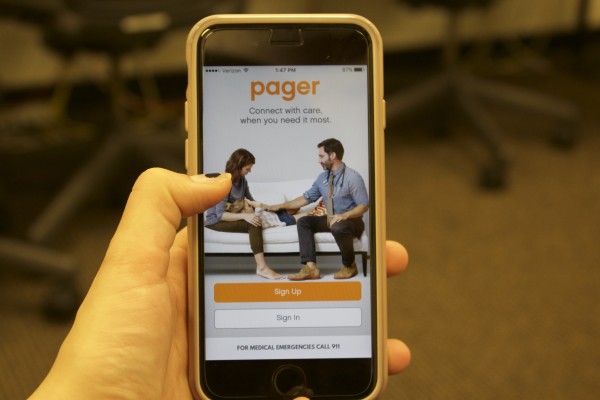Pager: The Future of Healthcare
The Pager App is attempting to change the way college students reach out to local physicians. (JESSICA HANLEY/THE OBSERVER)
March 9, 2016
The life of any New York City college student revolves around schoolwork, socializing, exploring and working. Students are concerned about everything and anything, except the most important thing: their health. Whether you are a commuter or a resident, your health should always be a priority. The good news is that for those of you who are dependent on Fordham’s Health Center or an urgent care facility, there is an alternative: Pager.
Pager is an on-demand mobile app service that provides people in New York City with healthcare service. Founded in 2014, the company’s mission is to reduce the costs for patients who are treated in a traditional healthcare setting. First, the app connects you with a triage nurse who assesses the level of care you need. Medical advice is then given by a health professional who determines the next step in your treatment. If further care is necessary, a board-certified doctor comes to visit you within the comfort of your home or office to treat your condition. Moreover, service is available between 8 a.m. and 10 p.m. every day of the year.
As students are absorbed in their schoolwork, they may forget to keep up with a primary care physician. Dore Murphy, the director of growth and retention at Pager, emphasized that their research proved this lack of care on the part of students. “When we talk to young people, we find not a lot of people have a primary care physician and they don’t spend a lot of time building relationships with doctors in this day and age.”
The ultimate goal of Pager is to enhance the current experience we have with traditional healthcare. For a college student, Pager generally serves as an alternative to visiting an urgent care facility. Murphy expressed this same sentiment, saying “the goal is to provide a better level of care and patient care experience at the end of the day.”
So, what does it cost to take care of one’s health? Concern about college tuition and other expenses can be worrisome alone. In a study by the Centers for Medicare and Medicaid Services in 2011, the average cost of personal health care per capita in New York State is $8,341. This ranks the Empire State as the sixth-highest in the nation.
Murphy stated that Pager “provides a better level of care at a lower cost.” The cost for a first-time in-person visit is $50. Any regular in-person visit to follow costs $200. This includes any on-site testing, treatments, surgical sutures and the first dosage of most prescriptions. Pager currently does not accept insurance payment as an option. However, Murphy did stress that “it is something we have definitely explored, and something we would like to be compliant with in the future.” This might be something to take into consideration when comparing Pager to a CityMD, MedRite Urgent Care, or a New York Doctors Walk-In Urgent Care. Both City MD and New York Doctors Urgent Care have cash rates beginning at about $125, while MedRite’s starting rate is roughly $140. In addition, all of these other walk-in clinics accept the majority of insurances. Pager currently does not accept insurance payments as an option. However, Murphy did stress that it “is something we have definitely explored, and something we would like to be compliant with in the future.”
When posed with the scenario of a patient being diagnosed with a chronic condition, Murphy explained that Pager’s emphasis is to treat “acute care, not managed care.” Acute care focuses on treatment that is necessary only for a short period of time, while chronic care is needed for an extended amount of time. If a patient does require chronic care, she said, “[Pager] would refer a patient to go visit a specialist.”
Some residents at Fordham may ask why they should use Pager as an alternative to visiting a nearby urgent care. Murphy reiterated with, “I think there are a couple of reasons. There is something really amazing about the convenience we are able to offer. There is a certain level and quality that Pager delivers and ensures, unique to our product and service.”
Murphy concluded by stating, “I think it is generally important to have a relationship with your health starting when you’re in college because you are on your own for the first time.” Pager currently serves patients in Manhattan and parts of northwestern Brooklyn and hopes to expand to Queens, New Jersey and Long Island soon.










